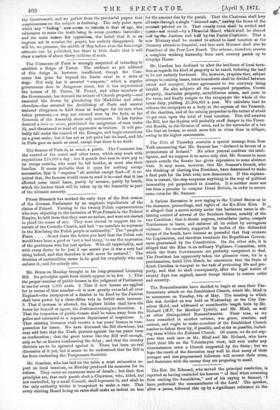Prince Bismarck has marked the early days of the first
session of the German Parliament by an emphatic repudiation of the claims of Poland. Turning to the twenty Polish representatives who were objecting to the inclusion of West Prussia in the Federal Empire, he told them that they were no nation, and were not elected to plead the cause of one. They were elected to support the in- terests of the Catholic Church, and had "no mandate to represent in the Reichstag the Polish people or nationality." The " people of Posen . . . . do not share the fiction you hold that the Polish rule would have been a good or ' not a bad thing,' to use the expression of the gentleman who has just spoken. With all impartiality, and with every desire to be just, I can assure you it was a very bad thing indeed, and that therefore it will never be restored." The doctrine of nationalities seems to be good for everybody who can enforce it, and for nobody else.


































 Previous page
Previous page